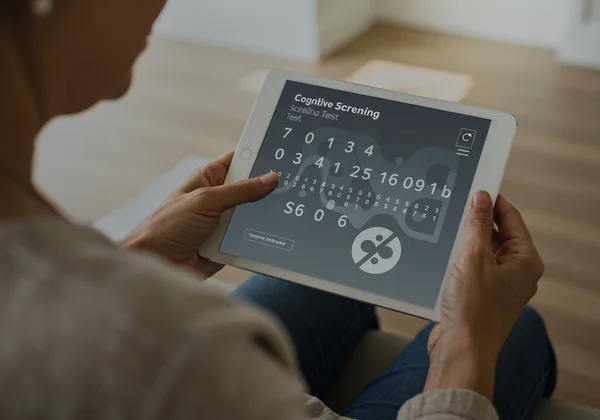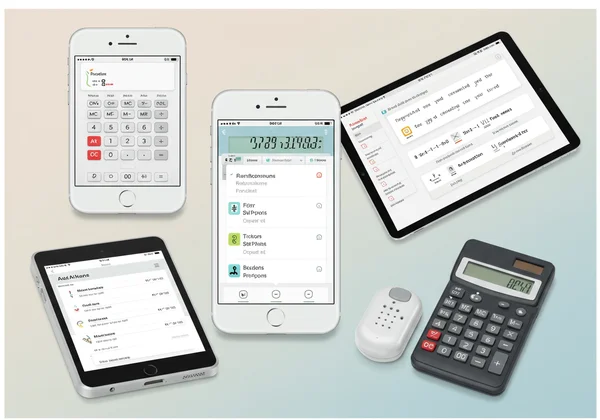การปรับตัวสำหรับผู้มีภาวะดิสแคลคูลียา: คู่มือสำหรับโรงเรียน วิทยาลัย และการประกอบอาชีพ
September 2, 2025 | By Aisha Bennett
การประสบปัญหาเกี่ยวกับตัวเลขไม่ใช่ภาพสะท้อนของความพยายามหรือสติปัญญา สำหรับหลายคน นี่คือสัญญาณของความแตกต่างในการเรียนรู้ เช่น ภาวะดิสแคลคูลียา คู่มือฉบับสมบูรณ์นี้มีขึ้นเพื่อให้ความกระจ่างเกี่ยวกับ การปรับตัวสำหรับผู้มีภาวะดิสแคลคูลียา โดยอธิบายว่าการสนับสนุนที่สำคัญเหล่านี้สามารถลดช่องว่างระหว่างศักยภาพและประสิทธิภาพในการเรียนที่โรงเรียน วิทยาลัย และการประกอบอาชีพของคุณได้อย่างไร แต่ก่อนที่จะแสวงหาความช่วยเหลือ หลายคนสงสัยว่า คุณจะทดสอบภาวะดิสแคลคูลียาได้อย่างไร? ขั้นตอนแรกมักจะเป็นการทำความเข้าใจลักษณะของความท้าทาย ซึ่งการประเมินเบื้องต้นสามารถให้ข้อมูลเชิงลึกได้อย่างน่าทึ่ง
การทำความเข้าใจลักษณะทางปัญญาที่เป็นเอกลักษณ์ของตนเองเป็นกุญแจสำคัญในการได้รับการสนับสนุนที่เหมาะสม จุดเริ่มต้นที่ดีคือการสำรวจจุดแข็งและจุดอ่อนที่เกี่ยวข้องกับคณิตศาสตร์ของคุณ คุณสามารถ เริ่มต้น ได้โดยใช้เครื่องมือที่ออกแบบโดยนักจิตวิทยาการศึกษาและผู้เชี่ยวชาญด้านคณิตศาสตร์ คู่มือนี้จะแนะนำคุณเกี่ยวกับประเภทของการปรับตัวที่มีอยู่ ช่วยให้คุณสามารถสนับสนุนตนเองหรือบุตรหลานของคุณได้

ทำความเข้าใจการปรับตัวสำหรับผู้มีภาวะดิสแคลคูลียา: สิ่งเหล่านี้คืออะไรและทำไมจึงสำคัญ
การปรับตัวสำหรับผู้มีภาวะดิสแคลคูลียาไม่ใช่การทำให้สิ่งต่างๆ "ง่ายขึ้น" แต่เป็นการทำให้การเรียนรู้และการทำงาน สามารถเข้าถึงได้ การปรับเปลี่ยนเหล่านี้ออกแบบมาเพื่อสร้างความเท่าเทียมกัน ทำให้บุคคลที่มีความแตกต่างในการเรียนรู้คณิตศาสตร์สามารถแสดงความรู้และทักษะของตนเองได้โดยไม่ถูกขัดขวางจากความท้าทายเฉพาะที่ภาวะดิสแคลคูลียานำเสนอ สิ่งเหล่านี้เป็นทางเลือกในการเข้าถึงข้อมูล ทำงานให้สำเร็จ และแสดงความเข้าใจ
คิดว่าสิ่งเหล่านี้เป็นเครื่องมือ ไม่ใช่สิ่งที่ใช้ทดแทนความสามารถ เช่นเดียวกับแว่นตาที่ช่วยให้คนสายตาสั้นมองเห็นกระดานได้อย่างชัดเจน การปรับตัวก็ช่วยให้คนที่มีภาวะดิสแคลคูลียาจัดการกับข้อมูลตัวเลขได้อย่างมีประสิทธิภาพ เป้าหมายคือการขจัดอุปสรรคเพื่อให้ความสามารถที่แท้จริงของบุคคลนั้นเปล่งประกายในสภาพแวดล้อมทางวิชาการและวิชาชีพ
นิยามการปรับตัว: มากกว่าแค่ "ไม้ค้ำยัน"
เป็นความเข้าใจผิดทั่วไปที่ว่าการปรับตัวให้ประโยชน์ที่ไม่ยุติธรรม ในความเป็นจริง สิ่งเหล่านี้คือ เครื่องมือสนับสนุน ที่จำเป็นซึ่งจัดการกับความแตกต่างทางระบบประสาทที่เฉพาะเจาะจง สำหรับผู้ที่มีภาวะดิสแคลคูลียา งานต่างๆ เช่น การจำข้อเท็จจริงทางคณิตศาสตร์ การจัดการปัญหาหลายขั้นตอน หรือการประมาณปริมาณในใจ อาจเป็นเรื่องที่เหนื่อยล้า การปรับตัวช่วยลดภาระทางปัญญานี้ ทำให้ทรัพยากรทางจิตใจว่างเพื่อมุ่งเน้นไปที่แนวคิดระดับสูงและการแก้ปัญหา ความแตกต่างนี้มีความสำคัญอย่างยิ่งต่อการสร้างสภาพแวดล้อมที่สนับสนุนซึ่งส่งเสริมความมั่นใจและการเติบโต
ใครบ้างที่ได้รับประโยชน์จากการปรับตัวสำหรับผู้มีภาวะดิสแคลคูลียา? การระบุความต้องการของคุณ
การปรับตัวสามารถเปลี่ยนแปลงชีวิตสำหรับบุคคลในทุกช่วงวัย ตั้งแต่เด็กที่ประสบปัญหาเกี่ยวกับการคูณไปจนถึงผู้ใหญ่ที่จัดการงบประมาณโครงการ การสนับสนุนที่ถูกต้องสามารถสร้างความแตกต่างได้อย่างมาก การระบุความต้องการเฉพาะของคุณคือขั้นตอนแรกในการพิจารณากลยุทธ์ที่มีประสิทธิภาพสูงสุด เกณฑ์คุณสมบัติ สำหรับการปรับตัวอย่างเป็นทางการมักจะต้องมีเอกสารประกอบ ซึ่งสามารถเริ่มต้นด้วยการคัดกรองเพื่อระบุสัญญาณที่อาจเกิดขึ้น การรับรู้สัญญาณเหล่านี้ผ่าน การทดสอบภาวะดิสแคลคูลียาออนไลน์ สามารถเป็นช่วงเวลาสำคัญในการเดินทางเพื่อรับความช่วยเหลือที่ถูกต้อง
การสนับสนุนภาวะดิสแคลคูลียาในสถานศึกษา
สำหรับนักเรียน ห้องเรียนอาจเป็นแหล่งของความวิตกกังวลอย่างมาก อย่างไรก็ตาม ด้วยกรอบการทำงานที่ถูกต้อง ห้องเรียนสามารถกลายเป็นสถานที่แห่งการเรียนรู้และความสำเร็จได้ สถาบันการศึกษามักจะมีความพร้อมในการให้การสนับสนุน แต่ต้องอาศัยการดำเนินการเชิงรุกจากผู้ปกครอง นักการศึกษา และนักเรียนเอง
เส้นทางโรงเรียน K-12: IEPs และ 504 Plans สำหรับภาวะดิสแคลคูลียา
ในระบบ K-12 มีสองเส้นทางหลักในการขอรับการสนับสนุนอย่างเป็นทางการ: แผนการศึกษาเฉพาะบุคคล (IEP) และ 504 Plan IEP สำหรับภาวะดิสแคลคูลียา เป็นส่วนหนึ่งของแผนการศึกษาพิเศษ โดยให้การสอนเฉพาะทางและการปรับตัว 504 Plan ภายใต้กฎหมายสิทธิพลเมือง ทำให้มั่นใจว่านักเรียนจะสามารถเข้าถึงการศึกษาได้อย่างเท่าเทียมกันผ่านการปรับตัว การทำความเข้าใจ สิทธิในการได้รับการศึกษา ของคุณเป็นสิ่งสำคัญ ผลการคัดกรอง เช่น จาก การทดสอบภาวะดิสแคลคูลียาสำหรับเด็ก สามารถให้ข้อมูลที่มีค่าเพื่อแบ่งปันกับโรงเรียนเมื่อหารือถึงความจำเป็นในการประเมินอย่างเป็นทางการ
การปรับตัวในห้องเรียนและการศึกษาเชิงปฏิบัติสำหรับนักเรียน
เมื่อมีแผนแล้ว การสนับสนุนเชิงปฏิบัติสามารถนำไปใช้ได้ กลยุทธ์ในห้องเรียน เหล่านี้ออกแบบมาเพื่อช่วยให้นักเรียนจัดการภาระงานและประมวลผลข้อมูลได้อย่างมีประสิทธิภาพ การปรับตัวที่พบบ่อยและมีประสิทธิภาพบางอย่าง ได้แก่:
- การขยายเวลา: เพิ่มเวลาในการทดสอบและงานที่เกี่ยวข้องกับคณิตศาสตร์
- การใช้เครื่องคิดเลข: อนุญาตให้ใช้เครื่องคิดเลขสำหรับงานในชั้นเรียนและการทดสอบทั้งหมด
- กระดาษกราฟ: ใช้กระดาษกราฟเพื่อช่วยจัดเรียงตัวเลขและคอลัมน์ในโจทย์คณิตศาสตร์
- ลดภาระงาน: เน้นคุณภาพของความเข้าใจมากกว่าปริมาณของปัญหา
- การเข้าถึงบันทึก: จัดสำเนาบันทึกของครูหรือบันทึกของเพื่อน
- สื่อการเรียนรู้ที่เป็นรูปธรรม: ใช้วัตถุทางกายภาพเพื่อทำความเข้าใจแนวคิดทางคณิตศาสตร์ที่เป็นนามธรรม
เครื่องมือการเรียนรู้ เหล่านี้ช่วยให้นักเรียนสามารถมีส่วนร่วมกับหลักสูตรได้ตามเงื่อนไขของตนเอง

การสนับสนุนภาวะดิสแคลคูลียาในวิทยาลัย: การนำทางในระดับอุดมศึกษา
การเปลี่ยนผ่านสู่ระดับวิทยาลัยนำมาซึ่งความท้าทายใหม่ๆ แต่การสนับสนุนก็ยังคงมีอยู่ วิทยาลัยส่วนใหญ่มีสำนักงาน บริการผู้พิการของมหาวิทยาลัย ที่อุทิศตนเพื่อช่วยเหลือนักเรียนที่มีความแตกต่างในการเรียนรู้ ในการรับ การสนับสนุนภาวะดิสแคลคูลียาในวิทยาลัย นักเรียนมักจะต้องแสดงเอกสารล่าสุดเกี่ยวกับความบกพร่องทางการเรียนรู้ของตน การปรับตัวในระดับนี้อาจรวมถึงการลงทะเบียนลำดับความสำคัญ การช่วยเหลือในการจดบันทึก และการใช้เทคโนโลยีช่วยเหลือระหว่างการสอบ การติดต่อกับสำนักงานบริการผู้พิการล่วงหน้าก่อนที่ภาคการศึกษาจะเริ่มต้นเป็นวิธีที่ดีที่สุดเพื่อให้แน่ใจว่าการเริ่มต้นเป็นไปอย่างราบรื่น
การปรับเปลี่ยนสถานที่ทำงานสำหรับภาวะดิสแคลคูลียา: ประสบความสำเร็จในการประกอบอาชีพของคุณ
ภาวะดิสแคลคูลียาไม่ได้หายไปหลังสำเร็จการศึกษา ผู้ใหญ่ในวัยทำงานมักเผชิญกับความท้าทายกับงานที่เกี่ยวข้องกับการวิเคราะห์ข้อมูล การจัดทำงบประมาณ หรือการจัดการเวลา โชคดีที่ การปรับเปลี่ยนสถานที่ทำงานสำหรับภาวะดิสแคลคูลียา ได้รับการคุ้มครองภายใต้กฎหมายเช่น Americans with Disabilities Act (ADA) ในสหรัฐอเมริกา ซึ่งกำหนดให้มี "การปรับตัวที่สมเหตุสมผล"
การปรับตัวทั่วไปสำหรับผู้ใหญ่ในการประกอบอาชีพ
สิ่งสำคัญคือการระบุหน้าที่งานที่ท้าทายและหาวิธีแก้ปัญหาที่เป็นรูปธรรม การปรับเปลี่ยนลักษณะงาน เหล่านี้มักจะเรียบง่ายแต่มีประสิทธิภาพสูง ตัวอย่างเช่น:
- เทคโนโลยี: ใช้ซอฟต์แวร์สำหรับการคำนวณ การจัดตารางเวลา และการสร้างภาพข้อมูล
- รายการตรวจสอบและแม่แบบ: สร้างคำแนะนำทีละขั้นตอนสำหรับงานที่ทำซ้ำๆ และมีตัวเลขจำนวนมาก
- พื้นที่ทำงานที่เงียบสงบ: มีตัวเลือกในการทำงานในสภาพแวดล้อมที่ปราศจากสิ่งรบกวนเมื่อต้องมุ่งเน้นข้อมูลที่ซับซ้อน
- การใช้รหัสสี: ใช้สีเพื่อจัดระเบียบสเปรดชีตและรายงานทางการเงิน
- เครื่องมือคำนวณ: จัดหาเครื่องคิดเลขพูดได้หรือแอปพลิเคชันพิเศษ
การระบุปัญหาเฉพาะของคุณคือขั้นตอนแรก รายงานที่ขับเคลื่อนด้วย AI สามารถให้ข้อมูลเชิงลึกเกี่ยวกับลักษณะทางปัญญาของคุณ ช่วยให้คุณระบุได้ว่าเครื่องมือและกลยุทธ์ใดที่อาจเหมาะกับคุณที่สุด

การเรียกร้องสิทธิ์ของตนเอง: การร้องขอการปรับตัวในการประกอบอาชีพ
การร้องขอการปรับตัวอาจรู้สึกน่ากลัว แต่เป็นสิทธิที่ได้รับการคุ้มครอง เริ่มต้นด้วยการทำความเข้าใจ สิทธิของพนักงาน และขั้นตอนของบริษัทของคุณ นัดหมายการประชุมส่วนตัวกับผู้จัดการหรือตัวแทนฝ่ายทรัพยากรบุคคลของคุณ วางกรอบการสนทนาเกี่ยวกับความปรารถนาของคุณที่จะทำงานได้อย่างมีประสิทธิภาพ อธิบายความท้าทายเฉพาะที่คุณเผชิญ และเสนอแนะการปรับตัวที่อาจช่วยได้ การนำเสนอวิธีแก้ปัญหาแสดงให้เห็นถึงการดำเนินการเชิงรุกและความมุ่งมั่นในบทบาทของคุณ
นอกเหนือจากการปรับตัวอย่างเป็นทางการ: การสร้างกลยุทธ์ส่วนบุคคล
ในขณะที่การปรับตัวอย่างเป็นทางการมีความสำคัญ การพัฒนากลยุทธ์ส่วนบุคคลก็มีความสำคัญไม่แพ้กันสำหรับการใช้ชีวิตประจำวันกับภาวะดิสแคลคูลียา มาตรการเชิงรุกเหล่านี้คุณสามารถใช้เพื่อสร้างความมั่นใจและจัดการกับความท้าทายได้อย่างอิสระ
การพัฒนานิสัยการเรียนรู้และการทำงานที่มีประสิทธิภาพที่ปรับให้เหมาะกับภาวะดิสแคลคูลียา
การปลูกฝังนิสัยที่ถูกต้องสามารถสร้างความแตกต่างได้อย่างมาก เทคนิคการเรียน และนิสัยการทำงานที่มีประสิทธิภาพมักจะเกี่ยวข้องกับการแบ่งข้อมูลออกเป็นส่วนย่อยๆ ที่จัดการได้ ใช้สื่อช่วยสอน แผนภาพ และตัวอย่างในชีวิตจริงเพื่อเชื่อมโยงแนวคิดทางคณิตศาสตร์ที่เป็นนามธรรมเข้ากับแนวคิดที่เป็นรูปธรรม เทคนิคการจัดการ เหล่านี้ช่วยลดความรู้สึกหนักใจและทำให้ข้อมูลตัวเลขน่ากลัวน้อยลง ตัวอย่างเช่น แทนที่จะจัดการกับสเปรดชีตงบประมาณขนาดใหญ่ในคราวเดียว ให้มุ่งเน้นไปที่หมวดหมู่เดียวในแต่ละครั้ง
การใช้ประโยชน์จากเทคโนโลยีช่วยเหลือสำหรับความท้าทายทางคณิตศาสตร์ในชีวิตประจำวัน
เราอยู่ในยุคทองของเทคโนโลยีช่วยเหลือ มี แอปสำหรับภาวะดิสแคลคูลียา และเครื่องมือมากมายที่ออกแบบมาเพื่อช่วยในทุกสิ่งตั้งแต่การคำนวณทิปไปจนถึงการจัดการการเงินส่วนบุคคล แอปเครื่องคิดเลข เครื่องมือจัดตารางเวลาพร้อมการแจ้งเตือน และแอปที่สแกนและแก้ปัญหาคณิตศาสตร์สามารถกลายเป็นพันธมิตรที่ขาดไม่ได้ สำรวจตัวเลือกต่างๆ เพื่อค้นหาสิ่งที่เหมาะกับสมองและไลฟ์สไตล์ของคุณมากที่สุด การทำ การคัดกรองภาวะดิสแคลคูลียาฟรี สามารถเป็นขั้นตอนแรกที่ดีในการทำความเข้าใจว่าเทคโนโลยีประเภทใดที่อาจเป็นประโยชน์มากที่สุด

เสริมพลังการเดินทางของคุณด้วยการสนับสนุนภาวะดิสแคลคูลียา
การใช้ชีวิตในโลกที่มีภาวะดิสแคลคูลียานำมาซึ่งความท้าทายที่ไม่เหมือนใคร แต่เป็นการเดินทางที่คุณไม่จำเป็นต้องเผชิญเพียงลำพัง การสนับสนุนในโรงเรียน วิทยาลัย และการประกอบอาชีพไม่ใช่การให้เปล่า แต่เป็นเครื่องมือสำคัญที่สร้างโอกาสที่เท่าเทียมกันสำหรับความสำเร็จ ด้วยการทำความเข้าใจความต้องการของคุณ การรู้สิทธิของคุณ และการเรียกร้องสิทธิ์ของตนเอง คุณสามารถสร้างสภาพแวดล้อมที่คุณสามารถเติบโตได้อย่างแท้จริง
เส้นทางสู่การเสริมพลังเริ่มต้นด้วยการทำความเข้าใจ หากคุณหรือคนที่คุณรู้จักประสบปัญหาเกี่ยวกับคณิตศาสตร์ ขั้นตอนแรกคือการทำความเข้าใจ เริ่มต้นการทดสอบฟรี บนเว็บไซต์ของเราเพื่อสำรวจลักษณะทางปัญญาของคุณ การคัดกรองที่ออกแบบโดยผู้เชี่ยวชาญของเราและการวิเคราะห์ที่ขับเคลื่อนด้วย AI (ไม่บังคับ) สามารถให้ข้อมูลเชิงลึกที่คุณต้องการเพื่อเริ่มต้นการเดินทางของคุณสู่การปลดล็อกการสนับสนุนที่เหมาะสม
คำถามที่พบบ่อยเกี่ยวกับการปรับตัวสำหรับผู้มีภาวะดิสแคลคูลียา
ฉันจำเป็นต้องได้รับการวินิจฉัยจากผู้เชี่ยวชาญเพื่อรับการปรับตัวสำหรับภาวะดิสแคลคูลียาหรือไม่?
สำหรับการปรับตัวอย่างเป็นทางการในโรงเรียน (IEP/504) หรือที่ทำงาน (ภายใต้ ADA) โดยทั่วไปจำเป็นต้องมีการวินิจฉัยจากผู้เชี่ยวชาญ อย่างไรก็ตาม การสนับสนุนที่ไม่เป็นทางการและกลยุทธ์ส่วนบุคคลจำนวนมากสามารถนำไปใช้ได้โดยอิงจากการคัดกรองเบื้องต้น เครื่องมือเช่นของเราสามารถเป็นขั้นตอนแรกในการรวบรวมข้อมูลก่อนที่จะแสวงหาการประเมินโดยผู้เชี่ยวชาญ
ขั้นตอนการร้องขอการปรับตัวสำหรับภาวะดิสแคลคูลียาที่โรงเรียนหรือการประกอบอาชีพคืออะไร?
ที่โรงเรียน กระบวนการมักจะเริ่มต้นด้วยการร้องขอการประเมินเป็นลายลักษณ์อักษรจากผู้ปกครองหรือครู ในที่ทำงาน จะเริ่มต้นด้วยการสนทนากับหัวหน้างานโดยตรงหรือแผนกทรัพยากรบุคคล ในทั้งสองกรณี ให้เตรียมพร้อมที่จะหารือเกี่ยวกับความท้าทายเฉพาะและเสนอแนะวิธีแก้ปัญหาที่เป็นไปได้
รูปแบบการปรับตัวสำหรับภาวะดิสแคลคูลียาแตกต่างกันสำหรับเด็กและผู้ใหญ่หรือไม่?
ใช่ มักจะแตกต่างกันในบริบทและการประยุกต์ใช้ การปรับตัวสำหรับเด็กจะมุ่งเน้นไปที่สภาพแวดล้อมการเรียนรู้ เช่น การใช้สื่อการเรียนรู้ที่เป็นรูปธรรมหรือการขยายเวลาสอบ สำหรับผู้ใหญ่ มักจะมุ่งเน้นไปที่งานเฉพาะ เช่น การใช้ซอฟต์แวร์พิเศษหรือแม่แบบสำหรับการจัดทำงบประมาณ อย่างไรก็ตาม หลักการหลักในการขจัดอุปสรรคยังคงเหมือนเดิม การทำความเข้าใจความแตกต่างเหล่านี้จะชัดเจนขึ้นหลังจากทำ การทดสอบภาวะดิสแคลคูลียาสำหรับผู้ใหญ่
เทคโนโลยีสามารถทำหน้าที่เป็นการปรับตัวสำหรับภาวะดิสแคลคูลียาได้หรือไม่?
แน่นอน เทคโนโลยีช่วยเหลือเป็นหนึ่งในรูปแบบการปรับตัวที่ทรงพลังที่สุด เครื่องคิดเลข แอปจัดตารางเวลา ซอฟต์แวร์อ่านออกเสียง และโปรแกรมพิเศษสามารถลดภาระทางปัญญาที่เกี่ยวข้องกับงานตัวเลขได้อย่างมาก ทำให้บุคคลสามารถมุ่งเน้นไปที่ความสามารถหลักของตนได้